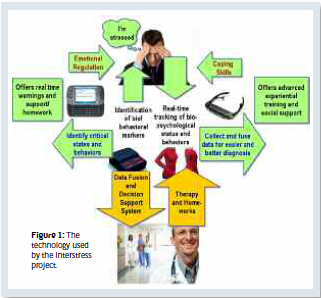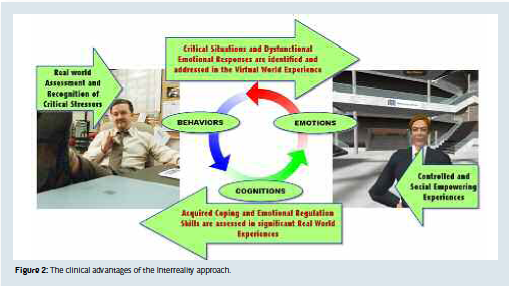By Giuseppe Riva, Brenda K. Wiederhold & Andrea Gaggioli
What if lowering your stress level was as easy and as much fun as playing a video game? What if all of the work was automated for you, with reminders on your mobile phone? What if the system that achieved this was so smart it changed the program the second you changed your behavior?
This is the vision we used to outline a new project funded by ICT for Health, European Commission. Called Interreality in the Management and Treatment of Stress-Related Disorders, or INTERSTRESS for short, the project aims to design, develop, and test an advanced ICT-based solution for the assessment and treatment of psychological stress.
“Psychological stress” occurs when an individual perceives that environmental demands tax or exceed his or her adaptive capacity. According to the Cochrane Database of Systematic Reviews the best validated approach covering both stress management and stress treatment is the Cognitive Behavioral (CBT) approach. Typically, this approach may include both individual and structured group interventions (10 to 15 sessions) interwoven with didactics. It includes in-session didactic material and experiential exercises and out-of-session assignments (practicing relaxation exercises and monitoring stress responses). The intervention focuses on:
• Learning to cope more effectively with daily stressors (psychological stress) or traumatic events (post traumatic stress disorder)
• Optimizing one’s use of personal and social resources
CBT has undergone a very large number of trials in research contexts. However, it has been less efficacious in clinical contexts and it has become obvious that CBT has some failings when applied in general practice. INTERSTRESS aims to design, develop and test an advanced ICT-based solution for the assessment and treatment of psychological stress that is able to address three critical limitations of CBT:
• The therapist is less relevant than the specific protocol used.
• The protocol is not customized to the specific characteristics of the patient.
• The focus of the therapy is more on the top-down model of change (from cognitions to emotions) than on the bottom-up (from emotions to cognitions).
To reach this goal the project will use a totally new paradigm for e-health – Interreality – that integrates assessment and treatment within a hybrid environment, bridging physical and virtual worlds. Our claim is that bridging virtual experiences – fully controlled by the therapist, used to learn coping skills and emotional regulation – with real experiences allows both the identification of any critical stressors and the assessment of what has been learned by using advanced technologies (virtual worlds, advanced sensors and PDA/mobile phones). We believe this is the best way to address the above limitations.
These devices are integrated around two subsystems (see Fig. 1) – the Clinical Platform (inpatient treatment, fully controlled by the therapist) and the Personal Mobile Platform (real world support, available to the patient and connected to the therapist) – that will be able to provide:

• Objective and quantitative assessment of symptoms using biosensors and behavioral analysis;
• Decision support for treatment planning through data fusion and detection algorithms, and provision of warnings and motivating feedback to improve compliance and long-term outcome.
By creating a bridge between virtual and real worlds, Interreality allows a full-time closedloop approach actually missing in current approaches to the assessment and treatment of psychological stress (see Fig. 2):

• The assessment is conducted continuously throughout the virtual and real experiences; it enables tracking of the individual’s psycho-physiological status over time in the context of a realistic task challenge.
• The information is constantly used to improve both the appraisal and the coping skills of the patient and creates a conditioned association between effective performance state and task execution behaviors.
Giuseppe Riva, Ph.D. Andrea Gaggioli, Ph.D. Istituto Auxlogico Italiano Italy
Brenda K. Wiederhold, Ph.D., MBA, BCIA Virtual Reality Medical Institute Belgium giuseppe.riva@unicatt.it
About Brenda Wiederhold
President of Virtual Reality Medical Institute (VRMI) in Brussels, Belgium.
Executive VP Virtual Reality Medical Center (VRMC), based in San Diego and Los Angeles, California.
CEO of Interactive Media Institute a 501c3 non-profit
Clinical Instructor in Department of Psychiatry at UCSD
Founder of CyberPsychology, CyberTherapy, & Social Networking Conference
Visiting Professor at Catholic University Milan.








